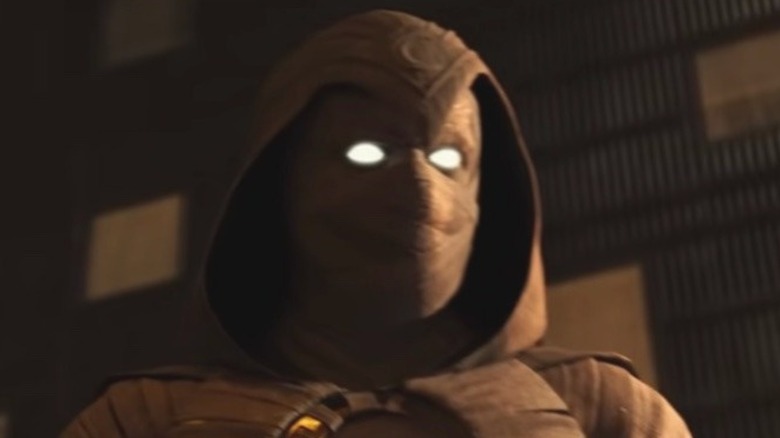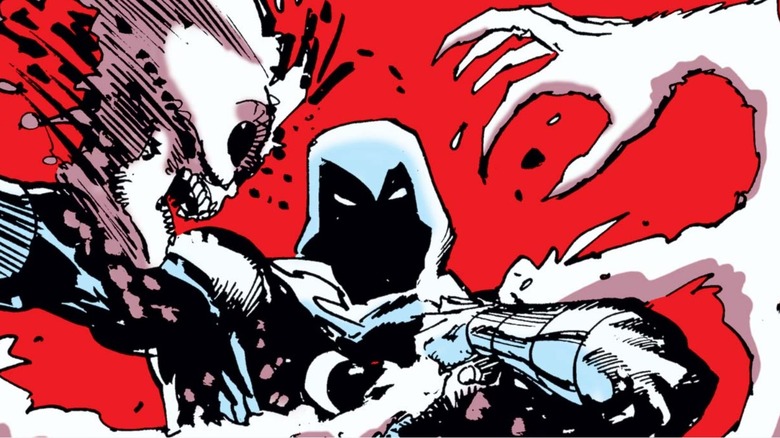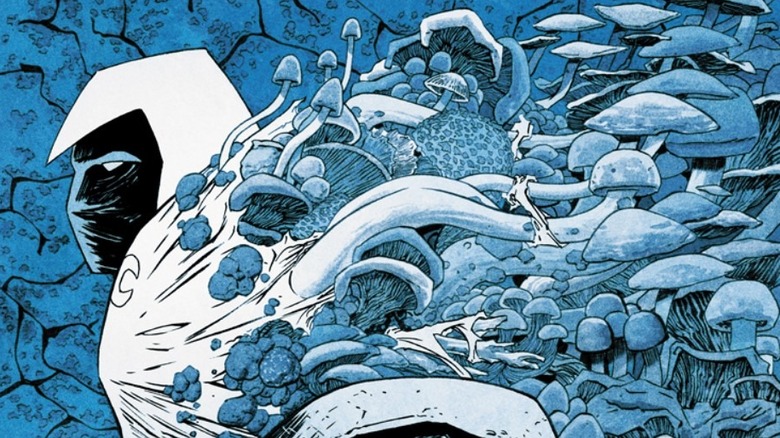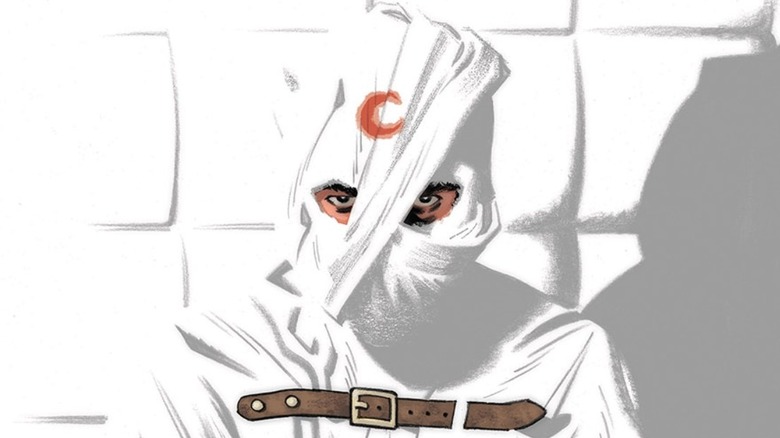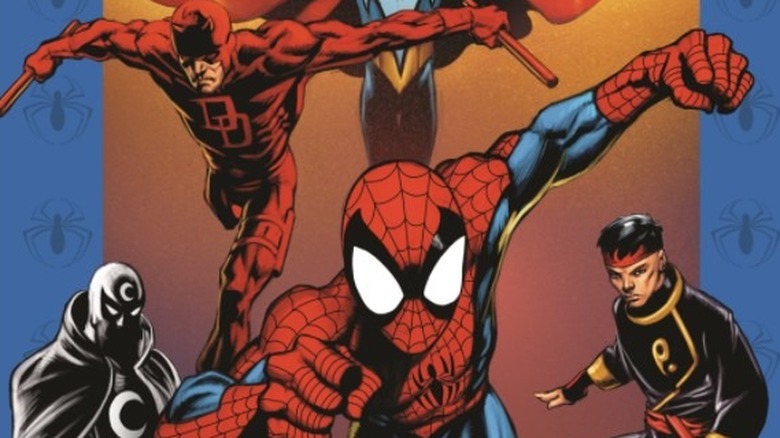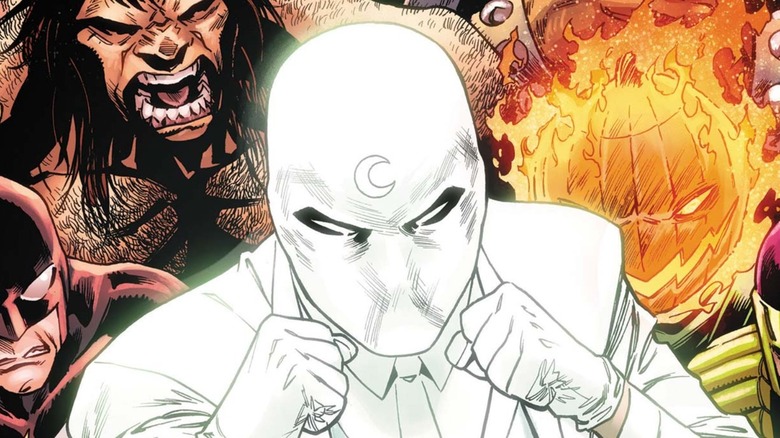Comics You Need To Read Before You Watch Moon Knight
Marvel and Disney+ are at it again with the upcoming release of "Moon Knight." While the more-than-a-decade-old Marvel Cinematic Universe broke records and changed the cinema experience as we know it (if you are still leaving before the end of the credits, you haven't been paying attention), there doesn't seem to be an end in sight, and "Moon Knight" looks to be the next in a batch of highly anticipated and beloved series for the streaming giant.
Moon Knight, of course, is Marc Spector — a Jewish man from Chicago with dissociative identity disorder (DID) who becomes a boxer, a U.S. Marine, and a CIA agent before disillusionment leads him to set out as a gun-for-hire. In the comics that inspired the upcoming series, he eventually works for a mercenary named Raoul Bushman, but when Bushman crosses the line, Spector rebels — only to be betrayed, and left for dead in the desert. In what could have been his last moments, he comes face-to-face with a statue of the Egyptian deity Khonshu — a manipulative entity that has been following him since childhood — and he is resurrected as Khonshu's avatar on Earth, the vigilante known as Moon Knight.
After almost five decades of adventures, Moon Knight has a rich history unique among the other heroes in Marvel Comics. His stories often focus on mental health, particularly Marc's diagnosis of DID, and his adventures tend to get pretty surreal and cerebral. If you are unfamiliar with the hero, or just looking to hype yourself up for the release this week, here are the five essential comics for you to read before watching "Moon Knight" on March 30.
Begin with the original Moench run
Anytime you are beginning a new series, the best place to start is typically the beginning. While Moon Knight appeared first in 1975's "Werewolf by Night," the character didn't get his own solo series until 1980.
The series was taken on by writer Doug Moench and artist Bill Sienkiewicz. This would be the longest run with a consistent writer and art team. Moench's run set the initial framework for other writers to follow when it came to the character having multiple personalities (though it wasn't established as DID, at this point), and this run introduced many of the other characters still seen today, including Marlene, Frenchie, Bushman, and more. While it's unclear which of these characters will appear on the Disney+ series, at this time, it's likely they'll all join the MCU eventually, given their importance to Moon Knight's story.
This is a longer run of comics, and those interested in reading it should check out two Epic Collections: "Bad Moon Rising," and "Shadows of the Moon." While Moon Knight has changed a lot in the decades since these comics, reading the books that first established the basics of the character Oscar Isaac will portray on the screen allows you to develop a good baseline of what to expect — think of it as akin to reading Stan Lee and Steve Ditko's original "Amazing Spider-Man" run.
Move on to 2013's 'From the Dead'
One thing that is easy to let happen when writing a comic is raising the stakes to the point of no longer being relatable. While few of us can relate to a superhero on a human level (unless, of course, you're hiding your Spidey sense from your aunt in a tiny New York apartment), keeping a character interesting and readable is an art that some writers do excel at. This relatability is what writer Warren Ellis achieved with his six-story run of comics in 2014's "From the Dead."
The six standalone stories, which keep Marc Spector staying street-level, allowed readers to see villains that could be right outside their door. Granted, you can't have a Moon Knight comic without a bit of mysticism, but Ellis was able to walk that line of mystical realism without losing the reader in a sea of unbelievability: while one issue sees the hero pursuing a sniper across skyscrapers, another has him actively delving into the dreamworld. Artist Declan Shalvey and colorist Jordie Bellaire deliver a Moon Knight that maintained his otherworldly status on the streets of New York by keeping him stark white, dropped against the grungy darkness of the Big Apple.
As an added bonus for the reader going back in time to read this for the first time, you will see the introduction of Mr. Knight — as well as the first appearance of the now-iconic Marvel version of Khonshu, who you will find familiar when watching episodes of the Disney+ series.
Moon Knight draws power from mental health with the Jeff Lemire run
Every hero has a weakness, a core aspect of their character that can make them seem just like the rest of us. An invulnerable human doesn't make a hero. It is easy to be heroic when nothing can hurt you, and you feel no pain. What makes a hero is the triumphant overcoming of a weakness — or facing that core part of your character that causes you great pain. "Moon Knight" #1-14, written by Jeff Lemire and with truly mind-blowing art by Greg Smallwood, focuses on this path. This run was recently collected in "Moon Knight by Lemire & Smallwood: The Complete Collection," for those who want to check it out.
Opening in a psychiatric institution, the new version of the series builds on itself by taking the readers on a journey of discovery through Marc Spector's mental health struggles. With such a topic being all the more relevant today as more and more cultural focus is placed on the importance of mental health, this series stands out as one of the character's most beloved runs of all-time. The Lemire/Smallwood run also offers a good look into his past: while the comic throws you into the deep end at the start, it eventually rewrites Spector's backstory in such a way that his dissociative identity disorder is emphasized, and as we see how he dealt with it from childhood to the present. This allows readers to view Moon Knight's path with more sympathy and compassion than ever before, leading to a conclusion you can genuinely cheer for.
With one "Moon Knight" TV spot giving us a peek at his struggles with mental health, the Disney+ series appears to be pulling a great deal of inspiration from this particular run.
See how he plays with others in Ultimate Knights
One of the aspects of the MCU that built it into a Hollywood powerhouse is the way it built on itself. Each entry into the "Infinity Saga" felt like one more building block that lifted it to new levels, like scaffolding reaching a destination of historic heights. Each new installment has to do the same thing with that structure in place, including "Moon Knight."
But can the mystical and gritty Moon Knight play well with others in the MCU? The majority of the franchise has played a bit more on the lighter side, with characters like Star-Lord and Tony Stark ready with the quick-witted comebacks. Lucky for us, the comics give us some insight into how that could look. "Ultimate Spider-Man" Volume 18: Ultimate Knights provides us with a look at Moon Knight teaming up with the likes of Daredevil, Shang-Chi, Doctor Strange, and, of course, Spider-Man.
This comic won't blow your socks off with storytelling consistency — this comic is set in the alternate "Ultimate" universe, and the Ultimate versions of these characters are always a little different. However, the main draw is the ironic appropriateness of the characters involved, with Spider-Man and Doctor Strange, two of the few holdovers from the "Infinity Saga," and newcomers to the MCU in Shang-Chi and Daredevil ready to make contributions. They could very well get together in a future MCU production, and this comic offers a glimpse at the potential future of the franchise.
Catch up with Moon Knight today with The Midnight Mission
Jed Mackay tackles Moon Knight in the newest run to pick up where Jeff Lemire left off in terms of focusing on Moon Knight's mental health in a positive way. "Moon Knight Vol. 1: The Midnight Mission" establishes the character as a man torn between his own spirituality, his mental health, and a desire to help victims of the darkness instead of just following the orders of an ancient Egyptian deity.
In this run, Marc Spector opens a mission to house those who have seen the monstrous and horrible. He preys on the forces of evil threatening his people while living in the dark and facing the reality that he is coming to odds with his past ways of thinking. His primary antagonist is the unwavering and devout Dr. Badr. While this is a living, breathing bad guy who provides action for comic lovers, he is also a perfect symbolic villain to ensure that the spiritual undertones are conflicted yet profound.
Adding to the realism of this storyline (as real as an Egyptian deity-powered superhero can be) is the fact that Spector has retained the counsel of a therapist to help him maintain and process his dissociative identity disorder, taking the ball that Jeff Lemire threw and running with it. Looking forward to the Disney+ series, it's possible that this angle might be explored somewhere down the line as Marc Spector (Oscar Isaac) begins to question his sanity. The addition of a similar therapist character, whether now or in the future, has the potential to add poignant scenes with unique character possibilities.
